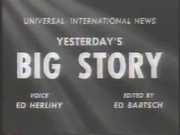|
|
The Yalta conference is often cited as the beginning of the Cold War. This meeting of the "Big Three" at the former palace of Czar Nicholas on the Crimean southern shore of the Black Sea took place February 4-11, 1945. Stalin's army had reached the Oder River and was poised for the final attack on Berlin, but Stalin on Feb. 3 had ordered Zhukov to pause while the conference was in session. His occupation of Poland was complete, and he possessed command of the largest army in Europe, 12 million soldiers in 300 divisions. Eisenhower's 4 million men in 85 divisions were still west of the Rhine. Strategic bombing had devastated German cities, and the last untouched major city in Germany would be destroyed Feb. 13 when Churchill sent his bombers over Dresden. Roosevelt appeared weak and tired in photos of the Yalta conference, and he would present his Yalta report to Congress March 1 sitting down. In two months, he would be dead of a massive cerebral hemorrhage. His physician, Dr. Howard Bruenn, has written that although FDR suffered from high blood pressure, there was no evidence that his health impaired his judgement at Yalta. Critics would accuse Roosevelt of a "sell-out" at Yalta, of giving away Eastern Europe to Stalin, of "secret deals" with a ruthless dictator. Bert Andrews in the New York Herald Examiner wrote about 4 secret deals: Russia's demand for $20 billion in reparations from Germany, for Poland to the Curzon line, for 3 seats in the United Nations, for territory in the Far East including Outer Mongolia, south Sakhalin Island, the Kuriles. Stalin did not hold free elections in Eastern Europe and the American press turned increasingly hostile to Russia. However, as Robert Dallek has pointed out in Franklin Roosevelt and American Foreign Policy, FDR was hoping the future United Nations organization would be the place to deal with Stalin, not at Yalta. He told Adolf Berle "I didn't say the result was good. I said it was the best I could do." Both Roosevelt and Churchill recognized the reality of Soviet power in 1945.

Sources:
- The images on this page, unless otherwise noted, are from the Franklin D. Roosevelt Library.
- Text of the Protocol of the Yalta Proceedings as published March 25, 1945 from Byrd archive.
- The best accounts of the Yalta Conference are Diane Clemens, Yalta (New York, 1970) and Russell D. Buhite, Decisions at Yalta (Wilmington, Del., 1986).
- The criticism of Yalta is discussed in Alan Theoharis, The Yalta Myths: An Issue in U.S. Politics, 1945-1955 (New York, 1970).
- The interpretation of Yalta as a product of power politics rather than ideology can be found in John Gaddis, Strategies of Containment (New York, 1982) and Melvyn Leffler, A Preponderance of Power (Stanford, 1992).
- Revisionist interpretations of the Cold War as a product of the ideology of monopoly capitalism include William A. Williams, The Tragedy of American Diplomacy (New York, 1972) and Walter LeFeber, America, Russia, and the Cold War, 1945-1990, 7th ed. (New York, 1992).
- The National Security Archive has images of the memos of Feb. 6 and Feb. 7 and Feb. 8 and Feb. 8, 1945
- Are We Winning, Mommy? 1987 film starts with the wartime alliance.
- History in Focus online journal 2006 issue on the Cold War examines the periphery interpretation